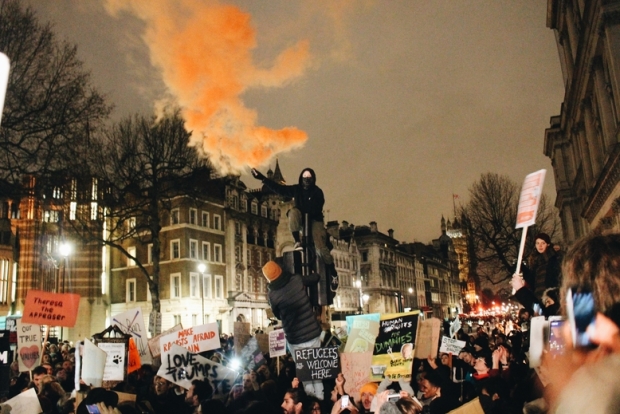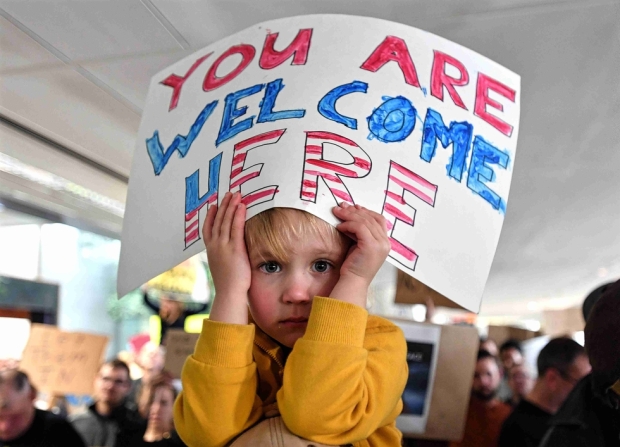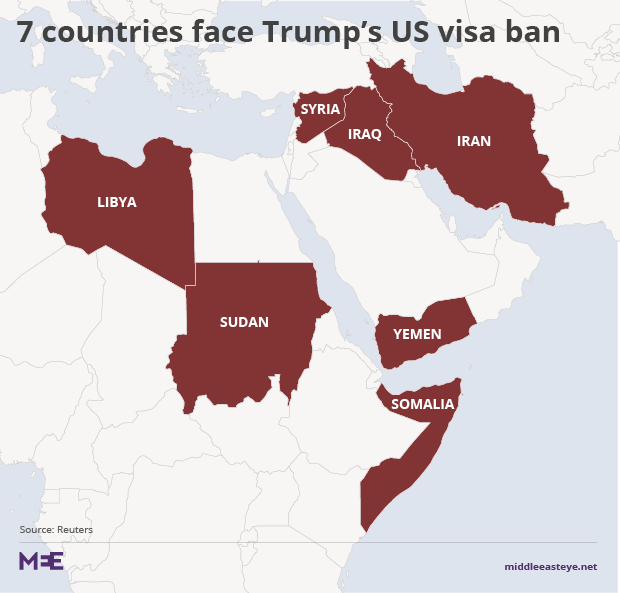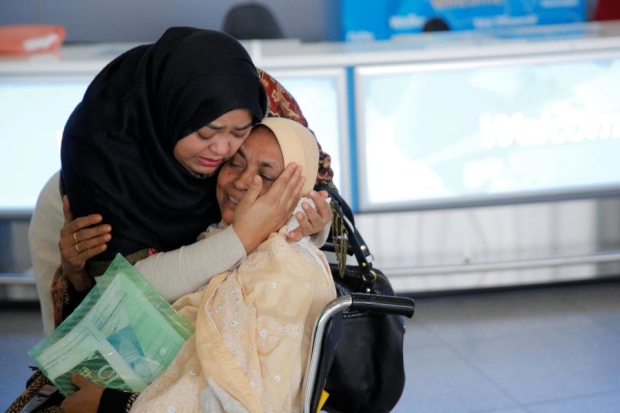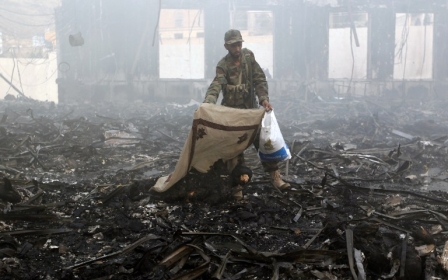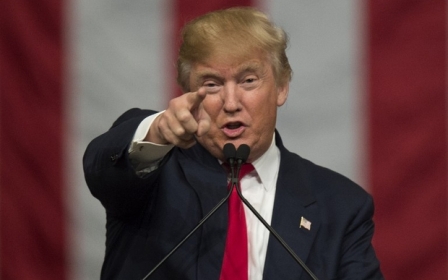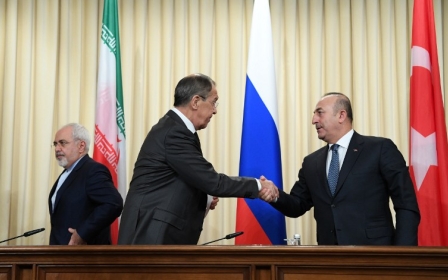Who speaks for Muslims? The Saudis, the Turks or the Germans?
The reaction to Donald Trump’s executive order to ban refugees and Muslims from seven countries has been unprecedented. Flash crowds descended on JFK and Dulles international airports on Saturday. When the New York Taxi Drivers Association held an hour-long protest at Trump’s ban, and Uber attempted to profit from it by turning off their surge price, a campaign was launched to delete the Uber app from phones.
Demonstrations erupted in Atlanta, Baltimore, Boston, Chicago, Dallas, Detroit, San Francisco, New York and Washington. Britain’s prime minister Theresa May hardly had time to unpack her bags from her trip to Washington, than she found that her newly formed “special relationship” with Trump had turned into a domestic political liability.
READ: Obama's true legacy is Trump
On a cold Monday evening, thousands of protesters jammed Whitehall outside Downing Street. A petition calling for Trump's state visit to Britain to be cancelled has already got 1m signatures.
Not since the invasion of Iraq in 2003 has anyone witnessed scenes like this. And a lot has happened in the Middle East since then, including the Gaza war, Libyan intervention, the massacre of protesters in Rabaa, Cairo and the fall of Aleppo. None of these major events has elicited anything like the same mass indignation.
Western moral outrage
It is not engendered by the issue itself: the heat is not being generated by a policy debate about the best way to prevent Islamic State (IS) attacks on Western soil. Anyone with a shred of knowledge about IS would tell you that Trump’s ban leaves the door open to the countries that provide the bulk of their foreign fighters.
Sensing this, German Chancellor Angela Merkel used her first call with the week-old US president to lecture him on what being a signatory to the Geneva Convention means.
For once, just once, a substantial body of western public opinion, so often accused of hypocrisy in the Arab world, is living up to its name as a force that believes that their nation’s behaviour should be based on values.
Deafening silence of Saudi
What then are the so-called leaders of the Arab world saying to Trump at this critical point? If Merkel read Trump the riot act, then how indignant and forthright was the Saudi King Salman, a man who calls himself the leader of the Muslim world?
What did the custodian of the Two Holy Mosques have to say to Trump about his ban on Muslims, or even the distinction the US president drew between Muslims and Christians in Arab countries?It’s not as if Salman had problems with access to the president. We know the two men talked for over an hour. They talked about Iran, safe zones in Syria, security co-ordination.
But Reuters reported that a senior Saudi source “had no word “ on whether the two leaders discussed Trump's order to put a four-month hold on allowing refugees into the United States and temporarily ban travellers from Syria and six other Muslim-majority countries.
In other words, Salman said nothing. He could have held his tongue out of fear about what this crazy man in the White House will do next. That certainly was the motivation for shutting down Saudi Arabia’s best foreign analyst, the journalist Jamal Khashoggi. (A similar thing happened to the Emirati academic and adviser Abdulkhaleq Abdullah). Or did Salman feel so desperate for US protection that he will do anything to get into Trump’s good books?
What then are the so-called leaders of the Arab world saying to Trump at this critical point?
Salman’s deafening silence is not is one of his memory lapses. The Palestinian President Mahmoud Abbas has also been told not to raise the awkward subject of Trump’s proposal to move the US embassy to Jerusalem, either in the Arab League or in the Organisation of Islamic Cooperation (OIC).
According to Arabi 21, Abbas has been assured that the US embassy will only be relocated to West Jerusalem. So that’s okay then. Who exactly told Abbas this is not clear - but the message from his Arab brothers is clear. If he sticks his neck out, they will not have his back.
Erdogan's short-sighted policy
If the leaders of the Arab world are quickly falling into line behind Trump, then so too, alas, is, Recep Tayyip Erdogan, the new strong man of Turkey and a president soon to have enhanced powers. The Turkish president commended Trump for putting a CNN reporter “in his place” after the US president refused to take a question from the network’s Jim Acosta, sparked after the news organisation published a report on Russian efforts to compromise the new incumbent of the Oval Office.
READ: Trump and the decline and fall of the West
Erdogan’s beef with the international media is long standing. He has accused them of publishing false information about the Gezi Park protests in 2013. However, his memories of CNN should not go as far back as that. It was a CNN affiliate, CNN Turk, which broadcast Erdogan’s iPhone appeal to Turks to stand firm against the attempted coup in July last year. That broadcast probably saved his life. Erdogan already seems to have forgotten that.
The most right-wing government in Israeli history will use Trump as a golden opportunity to pursue its agenda
This is an incredibly short-sighted policy. The most right-wing government in Israeli history will use Trump as a golden opportunity to pursue its agenda, which is to continue to advance its enormous footprint in the West Bank and continue its campaign against non-Jewish citizens of Israel and residents of Jerusalem. It will do so in the knowledge that it will not only face no resistance from Washington, but have its active encouragement.
Islamophobia debate goes mainstream
Trump has brought Islamophobia to the centre stage of the mainstream political debate. Suddenly the placards are saying: “We are all Muslims.” Trump is contaminating his most vocal supporters such as Israeli Prime Minister Binyamin Netanyahu, and alienating liberal Jews in the process. He's even reawakened painful memories of Jews arriving in America from the pogroms of Russia and Eastern Europe. He is doing something no Middle Eastern conflict has yet succeeded in doing: stirring the Western conscience.
Trump sees himself as leading the “civilised world”, a concept that specifically excludes Muslims
At this very point in time, Arab leaders walk away , consumed by their calculations for preserving their own corrupt regimes. Muslim countries should be in the first line of defence of Palestine. Instead, they are sending out the message that they are not bothered. In Trump, they face a man who, for the first time in post-war US history, is abandoning the title of leader of the free world. Instead, Trump sees himself as leading the “civilised world”, a concept that specifically excludes Muslims.
America’s darkest hour in peace time is the darkest hour for Arab leadership too. They, like Trump, will soon find that they need the credibility they are now squandering by not standing up for what is right, unlike the hundreds of thousands of ordinary people fighting on their behalf on the streets of London, Washington and New York.
Shame on them. They richly deserve the fate that awaits them, when the peoples of the Arab world finally get their chance to rid themselves of their dictators.
- David Hearst is editor-in-chief of Middle East Eye. He was chief foreign leader writer of The Guardian, former Associate Foreign Editor, European Editor, Moscow Bureau Chief, European Correspondent and Ireland Correspondent. He joined The Guardian from The Scotsman, where he was education correspondent.
The views expressed in this article belong to the author and do not necessarily reflect the editorial policy of Middle East Eye.
Photo: Protest in Seattle against President Donald Trump's travel ban, on 29 January 2017 (Reuters)
This article is available in French on Middle East Eye French edition.
Middle East Eye propose une couverture et une analyse indépendantes et incomparables du Moyen-Orient, de l’Afrique du Nord et d’autres régions du monde. Pour en savoir plus sur la reprise de ce contenu et les frais qui s’appliquent, veuillez remplir ce formulaire [en anglais]. Pour en savoir plus sur MEE, cliquez ici [en anglais].



